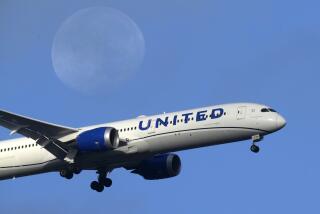Executive Travel : Firms Seek to Ground Costs by Clipping Frequent-Flier Miles : Budgets: More are turning to ‘reclaim programs,’ and employees aren’t smiling.
One of the perks of business traveling has been accumulating frequent-flier miles. But as companies try to squeeze excess costs from their travel budgets, a growing number are looking into ways to retrieve the mileage from employees.
In such “reclaim programs,” the company asks employees to use their free airline miles for corporate travel. In a few cases, companies “buy” their employee’s frequent-flier awards for a percentage of the cash value. The traveler has to give up a free ticket, but gets some money in return. For its part, the company gets to use the frequent-flier ticket at a nominal cost.
The programs are rarely popular with employees, who have traditionally put the miles toward personal use, such as vacations.
Indeed, a recent survey by the Bureau of National Affairs Inc., a Washington-based research firm, shows that only 9% of companies surveyed had a reclaim program in place. And six out of 10 said they allowed their employees to retain travel awards for personal use.
That may be changing, however. The issue of whether to reclaim has heated up again in the wake of a recent attempt by International Business Machines Corp. to get airlines to offer steeper corporate discounts in lieu of awarding frequent-flier miles to individuals. IBM was not able to negotiate such a deal, leaving many companies wondering what else they can do to save money on travel.
Within the last three months, IBM approached both American Airlines and United Airlines about ways to tailor the frequent-flier program to its needs. Both carriers refused.
“Basically, it would have required a lot of resources on our part to track the miles for all their employees,” said Teresa Hanson, spokeswoman for American. “We want to keep the program intact the way it is. It is set up so individuals can track the miles they earn and do with them whatever they want. We’re not going to police them.”
In general, airlines don’t want to get rid of their frequent-flier award programs because the perks build traffic and loyalty, said Ken Heldt, manager of frequent-flier services for RAN Decisions, a Colorado Springs, Colo.-based consulting firm that specializes in helping companies set up reclaim programs. In addition, frequent-flier programs provide airlines with a wealth of marketing information about their customer bases, he said.
If airlines are going to stick by their awards programs, businesses are realizing, the only way to save money on air travel is to capture those awards for use by the company, Heldt said. Indeed, RAN Decisions has seen a surge of interest on the part of companies looking to cut their costs by reclaiming miles. Heldt said he gets about six calls a day from firms interested in setting up such programs.
How much a company can save is affected by many variables, including which airlines are used, destinations and class of service. However, on average, companies can expect to save between 6% and 9% of their travel budget with a reclaim program, Heldt said. If companies are strategic in how they apply employees’ frequent-flier awards, they can boost their savings to between 8% and 12%, he added.
One obvious example, Heldt said, is to use a ticket award in place of a full-fare ticket, not a discount ticket, such as an advance-purchase fare.
Despite the potential savings, however, many companies are reluctant to start reclaim programs for fear of antagonizing employees.
“What has happened is at the beginning (these miles) were given to the employee as a perk for having to travel a great deal,” said Jeanne Epping, vice president of the American Society of Travel Agents in Washington. “It’s almost impossible to take something back that has been an established procedure.”
Companies that have reclaim programs try to find incentives for employees to cooperate. For example, they may ask employees to turn over air travel bonus miles but allow them to keep hotel bonus awards.
Because many of the hotel programs offer free mileage as well, it is still possible for employees to earn plane tickets for their own use, Heldt said. And companies may make arrangements for employees to stay in nicer hotels or hotels that allow the fastest accumulation of points toward tickets.
Still other companies pay for use of the award miles. At Dr. Pepper/7-Up Co. in Dallas, for example, the company will reimburse an employee $250 (less tax) if he or she turns over a frequent-flier award for use on company travel that would otherwise cost the firm $500 or more.
The company has had the program in place for about three years, Dr. Pepper corporate travel agent Christy McLeod said. “It’s voluntary, and it’s pretty popular,” she said.
The companies that have tried it are saving money. At Kansas City, Mo.-based Hallmark Cards Inc., employees accumulate miles for their department, which uses them for future travel. The company began its mileage program in May, 1992, for several reasons. “We wanted to find ways to make the existing travel budget go further,” spokeswoman Adrienne Lallo said.
Although the company does not release specific figures on its travel budget, Lallo said the savings are between 5% and 8% of total air travel costs.
Even so, some companies are reluctant to switch to reclaim programs.
At Mitsubishi Electronics of America in Cypress, for example, the company looked into retrieving employee miles, but decided it would be too difficult to manage, said corporate travel manager John Fazio. Since employees are being asked to be away from their homes on business, the company figures they are entitled to some compensation for their inconvenience.
“Mitsubishi feels it is a benefit to employees,” he said. “Let them keep it.”
More to Read
Sign up for The Wild
We’ll help you find the best places to hike, bike and run, as well as the perfect silent spots for meditation and yoga.
You may occasionally receive promotional content from the Los Angeles Times.






